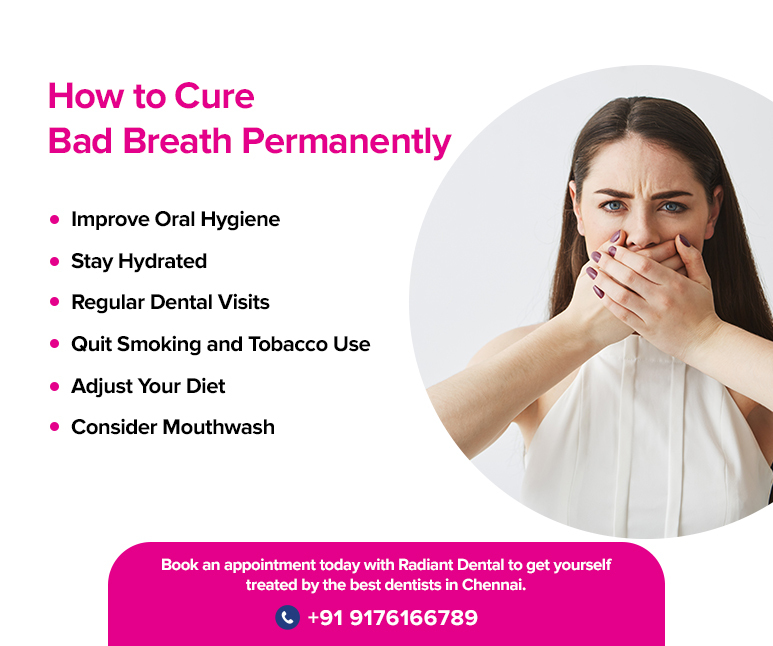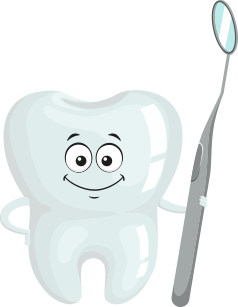What Causes Bad Breath – Know Symptoms, Diagnosis, and Treatment


Bad breath, also known as halitosis, is more than just an embarrassing condition – it can significantly impact one’s confidence and social interactions. Understanding its causes, recognizing the signs, and seeking effective treatment are crucial steps toward reclaiming your confidence and ensuring oral health. Let’s understand the world of bad breath, explore its types and treatments, and discover how Radiant Dental Care – a top dental clinic in Chennai stands as a ray of hope for those looking how to cure bad breath permanently.
The Impact of Bad Breath
Bad breath does not just affect your social life; it can also be a sign of underlying dental or health issues that need attention. Whether it is a temporary issue caused by certain foods or a persistent condition indicating something more serious, addressing bad breath is essential for both your well-being and overall health.
Recognizing the Signs and Symptoms of Bad Breath
It is not always easy to tell if you have bad breath, but here are some signs and symptoms of bad breath to look out for:
Persistent Unpleasant Odor: The most obvious sign is a constant bad smell from your mouth, which others might notice.
Dry Mouth: Saliva helps clean your mouth, so a dry mouth can lead to bad breath.
Bad Taste: An ongoing foul or bitter taste in your mouth can indicate bad breath.
White Coating on the Tongue: This can be a breeding ground for bacteria that cause bad odors.
Types of Bad Breath
Bad breath can come from several sources, and identifying the types of bad breath:
Oral Hygiene-Related: The most common type, caused by food particles and bacteria in the mouth.
Food-Related: Certain foods like garlic and onions can contribute to temporary bad breath.
Tobacco-Related: Smoking and chewing tobacco can lead to a distinct bad breath odor.
Health-Related: Sometimes, bad breath is a sign of a medical condition like sinus infections, diabetes, or digestive issues.


How to Cure Bad Breath Permanently
Permanently overcoming bad breath hinges on identifying and addressing its root cause. Here is how you can avail bad smell from mouth treatment:
Improve Oral Hygiene: Brush your teeth at least twice a day with fluoride toothpaste and floss daily. This removes food particles and plaque, the main culprits of bad breath. Don’t forget to brush your tongue, where bacteria often reside.
Stay Hydrated: Dry mouth contributes to bad breath. Drinking plenty of water helps keep your mouth moist and encourages the production of saliva, which naturally cleanses the mouth.
Regular Dental Visits: Seeing your dentist regularly for check-ups and cleanings is crucial. They can spot and treat gum disease, dry mouth, or other problems that might be causing bad breath.
Quit Smoking and Tobacco Use: Tobacco products lead to worse mouth odor and increase your risk of gum disease, another source of bad breath.
Adjust Your Diet: Limit foods that contribute to bad breath, like onions and garlic, and increase your intake of crunchy, water-rich fruits and vegetables that help clean your mouth as you eat them.
Consider Mouthwash: Therapeutic mouthwashes can help reduce plaque, gingivitis, cavities, and bad breath. Ask your dentist for a recommendation based on your specific needs.
Aftercare You Need
Keeping bad breath at bay involves continuous care and good habits. Here is what you can do to maintain that freshness:
Consistent Oral Hygiene: Continue with your improved oral hygiene routine. Consistency is key to keeping bad breath away.
Monitor Your Diet: Be mindful of what you eat. Foods with strong odors can affect your breath, so balance them with other neutralizing foods and plenty of water.
Chew Sugar-free Gum: Chewing stimulates saliva production, which helps clean the mouth. Opt for sugar-free gum to avoid contributing to tooth decay.
Replace Your Toothbrush Regularly: Old toothbrushes can harbor bacteria. Replace your toothbrush every three to four months to keep your cleaning routine effective.
Manage Dry Mouth: If you suffer from dry mouth, discuss solutions with your dentist. They may recommend specific products to help keep your mouth moist.
Conclusion
At Radiant Dental Care, we understand the challenges and discomforts associated with bad breath. As the best dental clinic in Chennai, we are committed to providing comprehensive solutions – from diagnosis to treatment and aftercare – to help you cure bad breath permanently. With our expert team, advanced facilities, and personalized care, we ensure that every patient leaves our clinic with a healthier mouth and renewed confidence. Let us help you breathe easy and smile brightly; visit Radiant Dental Care, your trusted dental hospital in Chennai, for all your oral health needs.
FAQs
What are the common signs of bad breath?
Ans. Common signs include a persistent unpleasant odor in the mouth, a bad taste that doesn’t go away, and people reacting negatively (like stepping back) when you talk.
Can bad breath be a sign of something serious?
Ans. Yes, while often related to oral hygiene, bad breath can also indicate gum disease, dry mouth, or medical conditions like sinus infections or diabetes.
How often should I visit a dentist to prevent bad breath?
Ans. Regular dental check-ups every six months are recommended to prevent bad breath, allowing for professional cleanings and the early detection of any potential issues.
Are there specific foods I should avoid to prevent bad breath?
Ans. Yes, foods with strong odors, such as onions and garlic, contribute to bad breath. It’s also wise to limit sugary foods that can lead to tooth decay, a common cause of bad breath.


